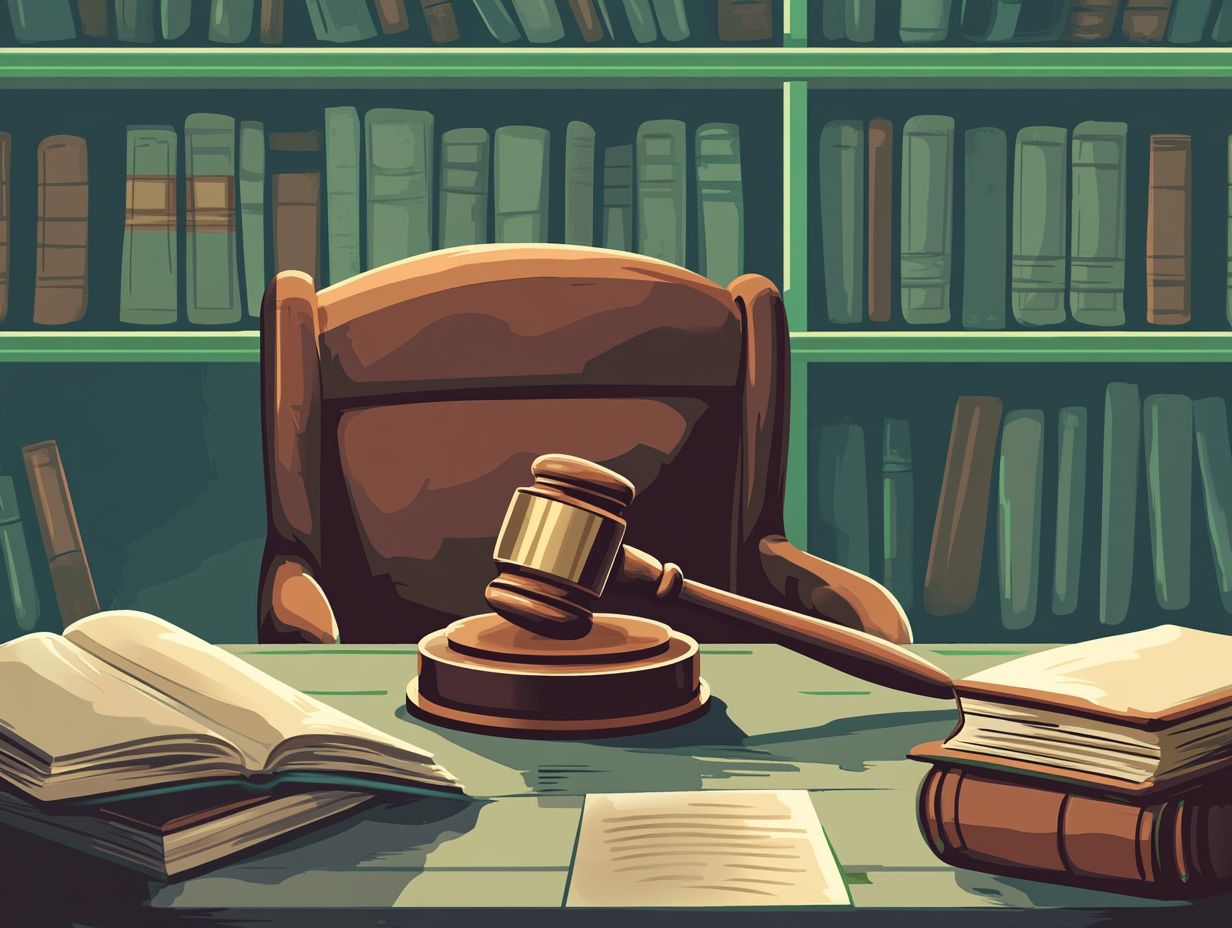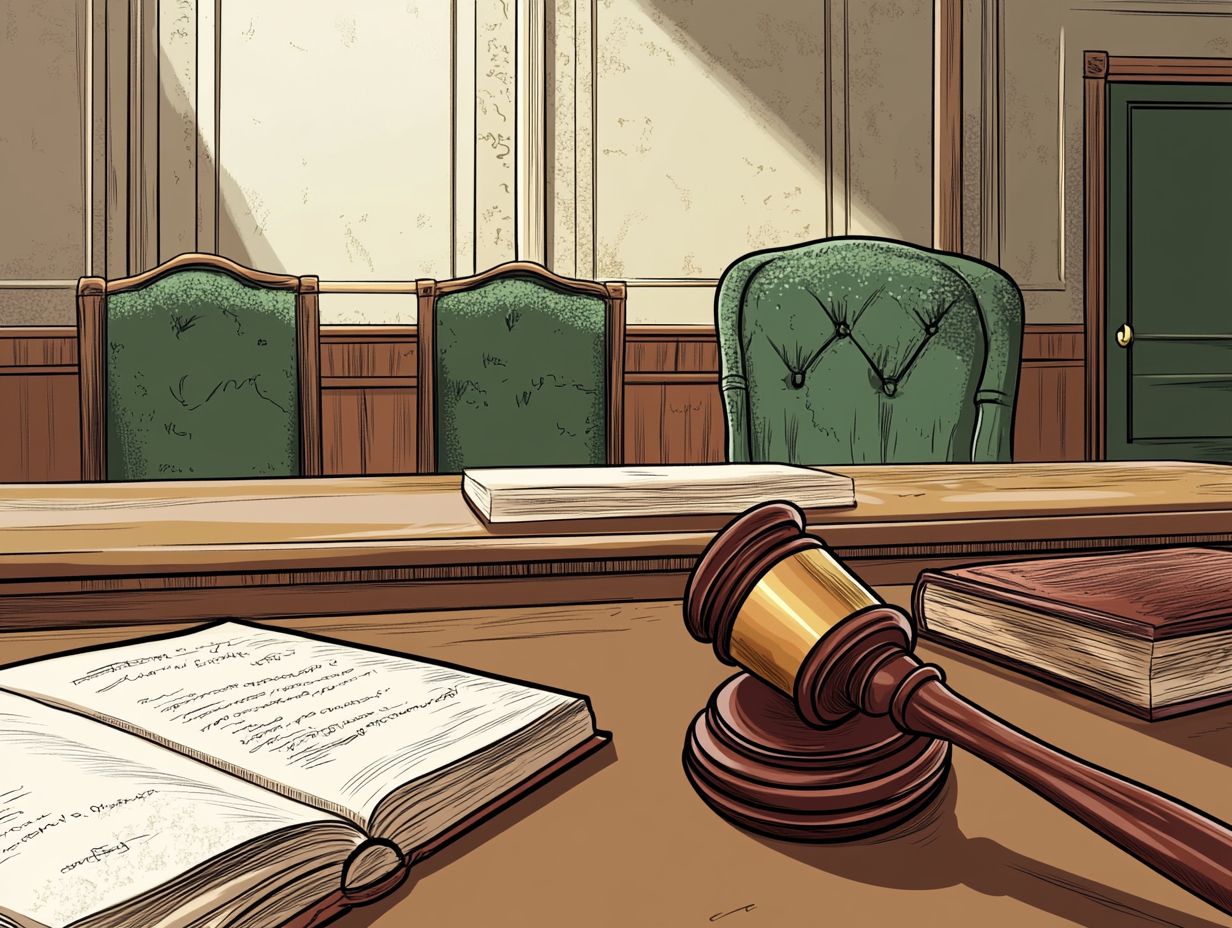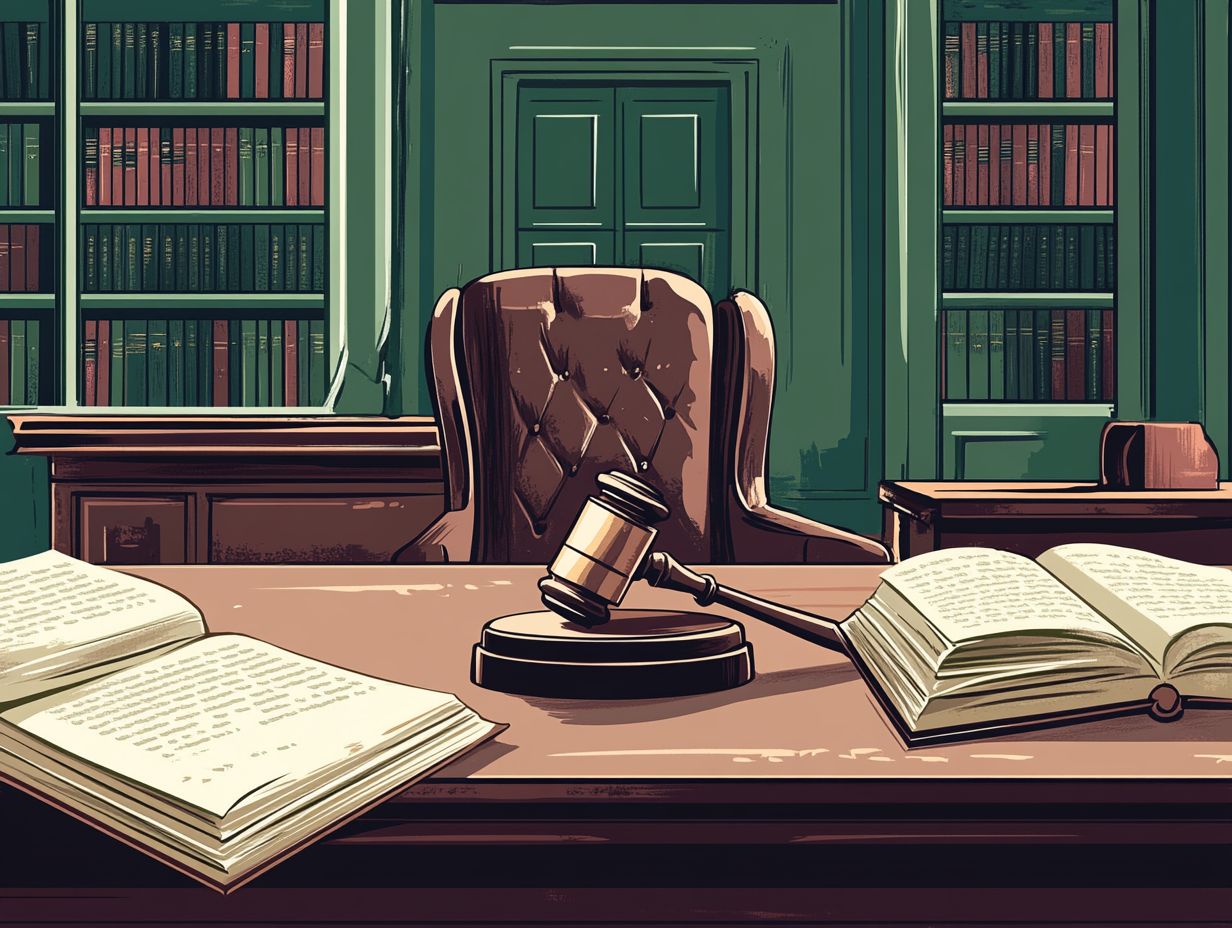5 Pitfalls in IP Litigation to Avoid
Intellectual property (IP) litigation can present a daunting landscape for your business, filled with complexities that may lead to costly mistakes. Understanding common pitfalls is essential for navigating this challenging arena with confidence and clarity.
This article highlights five key mistakes ranging from inadequate preparation to the neglect of legal expertise that could jeopardize your case. You will also learn about key concepts in IP litigation, the various types and challenges involved, and practical steps to safeguard your business.
Dive in to arm yourself with the knowledge necessary to tackle IP disputes effectively and confidently.
Contents
- Essential Points to Remember About IP Litigation:
- 1. Lack of Preparation and Thorough Research
- 2. Failure to Properly Document Evidence
- 3. Overlooking the Importance of Timelines and Deadlines
- 4. Don’t Overlook Alternative Dispute Resolution Methods
- 5. The Importance of Experienced Legal Representation
- What is Intellectual Property (IP) Litigation?
- Frequently Asked Questions
- What are the top 5 pitfalls to avoid in IP litigation?
- Why is it important to conduct a proper patent search?
- How can I properly identify and protect my IP assets?
- What can happen if I fail to enforce my IP rights?
- Why is it important to accurately calculate damages in IP litigation?
- How can I stay updated with changes in IP law?
Essential Points to Remember About IP Litigation:

Proper preparation and thorough research are crucial in IP litigation to avoid potential pitfalls.
Documenting evidence correctly and thoroughly can prevent issues in IP litigation.
Timelines and deadlines must be carefully considered and met to avoid delays and potential setbacks in IP litigation.
1. Lack of Preparation and Thorough Research
As a startup navigating the intricate world of intellectual property, you must recognize that a lack of preparation and thorough research can lead to critical mistakes that threaten your innovative product ideas and legal protection strategies. To avoid these pitfalls, consider exploring 5 ways to strengthen your IP litigation team.
In today s competitive landscape, grasping the nuances of patents, trademarks, and copyrights is essential for safeguarding your IP assets and securing a competitive edge. Conducting detailed market research not only informs an effective IP strategy but also helps you identify potential pitfalls that may arise from insufficient knowledge or oversight.
Beyond the theoretical importance of IP, a well-defined strategy acts as a robust shield against legal challenges and infringement claims. Different types of intellectual property serve distinct purposes; for instance, trademarks protect your brand identity and cultivate customer loyalty.
By engaging in comprehensive market analysis, you position yourself favorably against competitors while steering clear of costly litigation. Ultimately, neglecting the fundamentals of IP management can lead to lost revenue and an eroded market presence, highlighting the critical need for diligent preparation and ongoing monitoring.
2. Failure to Properly Document Evidence
Proper documentation of evidence is a cornerstone in the realm of intellectual property. When you fail to maintain clear records, you open the door to significant legal disputes and challenges in enforcing your IP rights, especially regarding requests to the government to protect your invention and copyright law.
This critical practice necessitates keeping comprehensive records of various forms of evidence, including legal contracts that keep sensitive information private and detailed logs of trade secrets. By meticulously documenting proprietary information and confidential communications, you can bolster your position in the event of infringement or disputes.
Inadequate documentation not only weakens your ability to prove ownership but also risks unfavorable legal outcomes, such as losing the right to defend your intellectual property or facing costly litigation. Ultimately, effective evidence management acts as a protective shield, ensuring that your innovations and creative endeavors remain safe from misappropriation.
3. Overlooking the Importance of Timelines and Deadlines
Don t underestimate the importance of timelines; they can make or break your IP rights. In the whirlwind of the startup environment, neglecting timelines and deadlines can significantly jeopardize your ability to secure intellectual property rights.
In terms of patent filing and provisional applications, timing is everything; a lapse could expose your innovations to public disclosure. Missing these critical dates can leave your valuable creations wide open to competitors, undermining the market advantage you ve worked so hard to establish.
Failing to meet deadlines doesn t just risk your patent rights; it can also trigger expensive litigation and financial complications. Imagine delaying your patent filing and finding yourself unable to protect your unique invention, allowing others to swoop in and take advantage of your hard work.
Act now to ensure your innovations are protected! To navigate these crucial elements effectively, consider leveraging project management tools and setting reminders for key dates, ensuring you re always a step ahead. Additionally, consulting with legal experts can offer peace of mind, helping you avoid any missed deadlines and safeguarding your innovations to maintain your competitive edge.
4. Don’t Overlook Alternative Dispute Resolution Methods

Ignoring alternative dispute resolution methods in intellectual property disputes could lead you down a path of lengthy and costly litigation. This means resolving conflicts outside of court is essential.
Choosing these strategies can significantly reduce legal expenses and expedite the resolution process. This enables you to focus on what truly matters: innovation, rather than being mired in protracted court battles.
For startups, often operating with limited resources, leveraging these alternative methods can preserve your capital and streamline your operations.
To effectively navigate this landscape, prioritize the following:
- Establish clear communication channels
- Prepare comprehensive documentation of your IP assets
- Engage actively in the negotiation process
By embracing these approaches, you can strengthen your competitive edge while safeguarding your intellectual property rights. Take action now to safeguard your innovations with the right legal strategies!
5. The Importance of Experienced Legal Representation
Startups that overlook the significance of experienced legal representation risk their intellectual property strategies. Skilled IP attorneys are critical for navigating the complexities of patentability, copyrights, and trademarks, especially amidst fierce market competition.
These professionals not only help identify and protect your valuable innovations, but also guide you through the intricate maze of regulatory compliance and legal frameworks. They offer insights on strategic patent filings to safeguard your unique inventions and assist in navigating potential copyright issues from digital content. Furthermore, they ensure that your trademark registrations are properly in place to avoid infringement.
When selecting legal advisors, seek those who have a deep understanding of your industry, a proven track record in intellectual property law, and a proactive approach to emerging challenges. This will forge a solid foundation for your growth and protect your creative assets.
What is Intellectual Property (IP) Litigation?
Intellectual property (IP) litigation involves the intricate legal processes you must navigate to enforce and defend your IP rights. This addresses disputes over patents, copyrights, trademarks, and trade secrets, which are increasingly vital for startups as you strive to protect your innovations and maintain your market position.
For emerging businesses, understanding the complex landscape of IP rights is crucial. You may not have the resources of larger corporations at your disposal. Various disputes, such as infringement claims or allegations of misappropriation, can arise unexpectedly and threaten your operational stability.
In these situations, having legal expertise is essential. It ensures you grasp your rights and the implications of your actions. Effective legal counsel can help you draft robust IP agreements and develop strategies to mitigate risks, creating an environment where your innovation can thrive without undue external pressures.
What Are the Different Types of IP Litigation?
You’ll encounter several distinct types of IP litigation, including cases involving patents, copyrights, trademarks, and trade secrets. To effectively address these complexities, consider following 5 tips for choosing an IP litigation attorney, as each area demands specialized legal knowledge to tackle the unique challenges they present.
Take patents, for instance. Disputes often arise over infringement issues, with one party claiming that another is unlawfully using their patented invention without permission.
In copyright litigation, you typically find cases involving unauthorized reproduction or distribution of creative works think music, literature, and digital content.
When it comes to trademarks, the focus shifts to brand protection and consumer confusion, with counterfeiting and trademark dilution frequently at play.
Trade secret litigation dives into the misappropriation of confidential business information, raising intricate questions about employee obligations and non-disclosure agreements.
Each of these categories presents its own set of nuances that necessitate a comprehensive understanding for effective legal representation.
What Are the Common Challenges in IP Litigation?

IP litigation has many challenges. You need to gather enough evidence, meet strict deadlines, and understand complex IP rights. One can explore ways to strengthen your IP case before litigation to navigate these hurdles effectively.
Careful record-keeping is essential; missing documents can lead to weak claims or counterclaims that hurt your position.
Understanding the different legal implications across various jurisdictions adds complexity to your case. This highlights the need for skilled legal guidance.
For instance, failing to register a trademark before filing can waste years of resources and lead to infringement issues.
You must remain vigilant regarding common pitfalls. Timely responses to legal notices and understanding licensing agreements are crucial; errors can jeopardize your standing.
How Can Businesses Protect Themselves from IP Litigation?
To shield yourself from IP litigation risks, it s essential to adopt comprehensive legal protection strategies. Use employment agreements, NDAs (Non-Disclosure Agreements), and confidentiality clauses to protect your trade secrets and innovative ideas.
Regular IP audits reviews of your intellectual property can help identify vulnerabilities and allow for timely adjustments.
Educating employees about IP rights fosters a culture of respect for proprietary information.
Implementing proactive legal agreements and clear policies creates a framework that minimizes disputes and clarifies responsibilities regarding valuable assets.
What Are the Steps Involved in IP Litigation?
The steps in IP litigation are complex. You’ll need to initiate the legal process, gather evidence, file motions, and navigate court proceedings—each task requires attention to detail. To enhance your approach, be aware of the top 10 mistakes in IP strategy to avoid.
Understanding these stages is vital for businesses eager to protect their intellectual property. The initial phase involves crafting a strategic approach to outline infringements and the legal basis for your claim.
Be diligent when gathering evidence; accurate documentation of your innovations strengthens your case.
Filing motions may seem complicated, but effectively countering opposing arguments acts as a shield. Court proceedings require a solid understanding of legal protocols, enabling you to navigate this landscape confidently.
Preparation involves aligning internal resources to establish a robust defense against potential infringement.
What Are the Potential Outcomes of IP Litigation?
The outcomes of IP litigation can vary greatly. They range from favorable judgments that strengthen your IP rights to costly settlements or even the loss of valuable intellectual property. Startups must approach IP litigation strategically.
By understanding these scenarios, you can navigate legal complexities more effectively. A favorable judgment can enhance your market position and boost investor confidence, while a defeat may drain resources and hinder growth.
Emerging businesses should invest in thorough IP audits and maintain meticulous documentation of their innovations. Seeking legal counsel with expertise in IP disputes is also wise.
Craft a robust risk management strategy and explore alternative dispute resolution options to mitigate potential fallout and protect your innovative assets.
Frequently Asked Questions

Don t wait until it s too late! Take definitive steps to protect your IP by consulting with a legal expert today.
What are the top 5 pitfalls to avoid in IP litigation?
Avoid these five common pitfalls in IP litigation: failing to do a proper patent search, not identifying and protecting your intellectual property (IP) assets, neglecting to enforce your IP rights, miscalculating damages, and not keeping up with common IP litigation mistakes.
Why is it important to conduct a proper patent search?
A thorough patent search helps you find existing patents that could affect your case. This knowledge allows you to make smart decisions about your own IP and can save you from expensive legal battles.
How can I properly identify and protect my IP assets?
Start by conducting an internal audit to list all your IP assets, such as patents, trademarks, and copyrights. Once identified, register and manage these assets to ensure they’re protected during litigation.
What can happen if I fail to enforce my IP rights?
Failing to enforce your IP rights can lead to losing exclusive control over your IP. It s essential to monitor and protect your rights actively to safeguard your business assets.
Why is it important to accurately calculate damages in IP litigation?
Calculating damages accurately is crucial for determining the compensation you deserve. Mistakes here could result in lost profits and missed opportunities for your business.
How can I stay updated with changes in IP law?
Staying informed about IP law changes is key to avoiding pitfalls in litigation. Regularly consult with a knowledgeable IP lawyer and follow recent trends in IP litigation in your industry to stay ahead.






